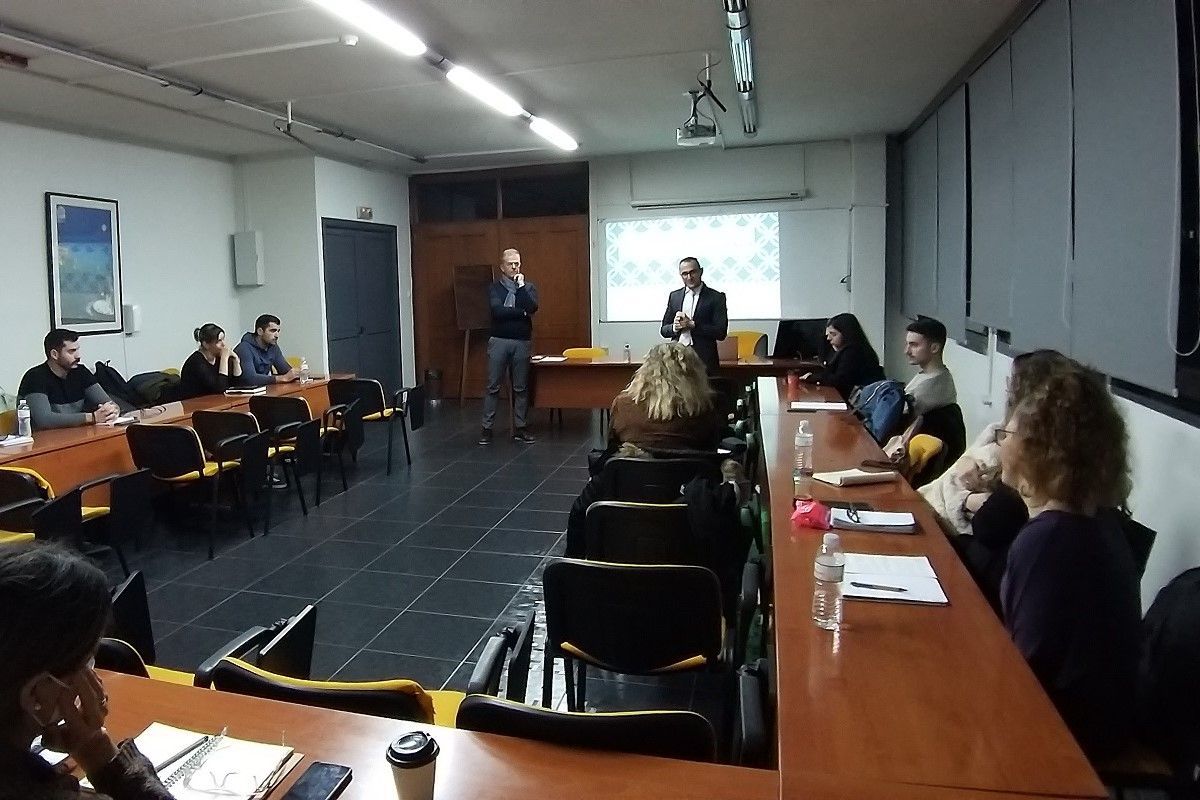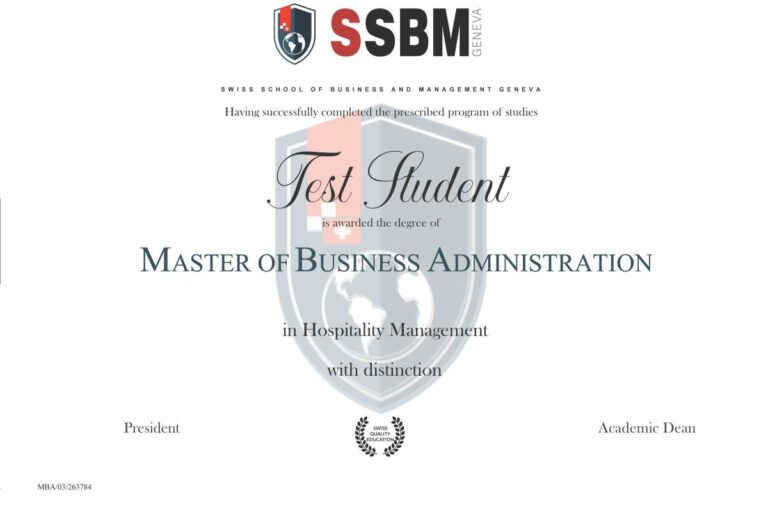Hotel Management Online MBA A Comprehensive Guide
Hotel Management Online MBA programs offer a flexible and convenient pathway to a rewarding career in the hospitality industry. This innovative approach to higher education allows aspiring hospitality leaders to pursue advanced business knowledge while maintaining existing professional commitments or accommodating personal circumstances. We’ll explore the curriculum, career prospects, technological tools, and financial considerations associated with this increasingly popular degree option, providing a thorough understanding of what this exciting educational journey entails.
This guide delves into the specifics of online Hotel Management MBA programs, examining the various specializations available, the technological platforms used for learning, and the robust career development and networking opportunities provided. We also address the cost and return on investment, accreditation considerations, and the unique challenges and advantages of online learning in this field. Ultimately, we aim to equip prospective students with the information necessary to make an informed decision about pursuing this valuable qualification.
Program Overview
An online MBA in Hotel Management offers a flexible and comprehensive education for aspiring and current hospitality professionals. This program equips students with the business acumen and management skills necessary to excel in the dynamic and competitive hotel industry, allowing them to advance their careers while maintaining their current work-life balance. The curriculum blends theoretical knowledge with practical applications, preparing graduates for a variety of leadership roles.
Typical Curriculum
The curriculum of an online Hotel Management MBA typically includes a core set of business courses, such as accounting, finance, marketing, and strategic management. These foundational courses provide the essential business knowledge needed to understand and manage the financial and operational aspects of a hotel. Beyond the core business courses, the program delves into specialized hospitality subjects. These might include revenue management, hotel operations management, human resource management in hospitality, food and beverage management, and hospitality sales and marketing.
Many programs also incorporate case studies, simulations, and projects that reflect real-world scenarios within the hotel industry, enhancing the practical application of learned concepts. Electives may allow for specialization in areas such as luxury hotel management or sustainable hospitality practices.
Admission Requirements
Admission requirements for online Hotel Management MBA programs vary between institutions but generally include a bachelor’s degree from an accredited institution, a minimum GPA (often around 3.0 or higher), and GMAT or GRE scores (although some programs may waive these requirements based on professional experience). Many programs also require professional experience in the hospitality industry, demonstrating a commitment and understanding of the field.
A strong application typically includes a compelling personal statement showcasing the applicant’s career goals and motivations for pursuing an online MBA in Hotel Management, along with professional references that can attest to their skills and potential.
Comparison of Online and On-Campus Learning
An online Hotel Management MBA offers a flexible learning experience, allowing students to access course materials and participate in classes at their convenience. This flexibility is particularly beneficial for working professionals who may not be able to attend traditional on-campus classes. However, the on-campus experience provides opportunities for direct interaction with professors and peers, fostering a sense of community and collaboration that can be more challenging to replicate in an online environment.
While online programs utilize various technologies to facilitate interaction, such as virtual classrooms and online discussion forums, the level of spontaneous interaction and networking opportunities might be less frequent compared to an on-campus setting. Both formats offer rigorous academic content, but the learning environment and pace differ significantly.
Career Paths After Graduation, Hotel management online MBA
Graduates of an online Hotel Management MBA program are well-positioned for a variety of leadership roles within the hospitality industry. Possible career paths include Hotel General Manager, Revenue Manager, Director of Sales and Marketing, Food and Beverage Director, Human Resources Manager, and various other management positions within hotel chains, independent hotels, resorts, and cruise lines. The advanced business skills and specialized hospitality knowledge gained through the program make graduates highly competitive candidates for senior management positions.
Some graduates may also choose to pursue entrepreneurial ventures, starting their own hospitality businesses or consulting firms. For example, a graduate might leverage their skills to open a boutique hotel, manage a resort’s operations, or consult for a chain on optimizing revenue strategies.
Specializations within Hotel Management MBAs
An online MBA in Hotel Management offers a flexible and comprehensive education, but many programs allow for specialization to cater to individual career goals. Choosing a specialization allows students to focus their studies on a specific area of the hospitality industry, developing in-depth expertise and enhancing their career prospects. This section will explore three common specializations and their associated benefits.
Hotel Revenue Management
This specialization focuses on the strategic application of data analysis and forecasting techniques to maximize hotel revenue. Students gain proficiency in yield management, pricing strategies, forecasting demand, and revenue optimization tools. The curriculum typically includes courses in statistical modeling, data analytics, and revenue management software. Graduates with this specialization are highly sought after by hotels and resorts seeking to improve their profitability and market share.
They often assume roles such as Revenue Manager, Director of Revenue Management, or Pricing Analyst. These professionals play a critical role in setting optimal pricing strategies, managing inventory, and increasing overall revenue generation. For example, a revenue manager might use sophisticated software to predict occupancy rates during peak seasons and adjust room rates accordingly, maximizing profitability.
Hospitality Marketing and Sales
This specialization equips students with the skills and knowledge to effectively market hotel products and services. The curriculum covers topics such as digital marketing, branding, social media marketing, customer relationship management (CRM), and sales strategies. Students learn to develop and implement comprehensive marketing campaigns, analyze market trends, and manage customer relationships. Career opportunities include roles such as Marketing Manager, Sales Manager, Digital Marketing Specialist, and E-commerce Manager.
A successful hospitality marketing and sales professional might design a targeted social media campaign to attract a specific demographic of travelers, or develop a loyalty program to retain existing customers.
Hotel Operations Management
This specialization focuses on the efficient and effective management of hotel operations. The curriculum covers topics such as human resource management, supply chain management, cost control, quality assurance, and sustainable operations. Students learn to optimize hotel processes, manage staff, and ensure high levels of guest satisfaction. Graduates are prepared for roles such as Hotel Manager, General Manager, Operations Manager, and Food and Beverage Manager.
A skilled operations manager might implement new technologies to streamline check-in/check-out processes, improving guest experience and operational efficiency. They might also focus on optimizing staffing levels to balance service quality and cost-effectiveness.
| Specialization | Required Courses (Examples) | Career Opportunities |
|---|---|---|
| Hotel Revenue Management | Yield Management, Data Analytics for Revenue Management, Forecasting and Demand Analysis, Revenue Management Software Applications | Revenue Manager, Director of Revenue Management, Pricing Analyst |
| Hospitality Marketing and Sales | Digital Marketing Strategies, Hospitality Branding, Social Media Marketing, CRM, Sales Management | Marketing Manager, Sales Manager, Digital Marketing Specialist, E-commerce Manager |
| Hotel Operations Management | Human Resource Management in Hospitality, Supply Chain Management, Cost Control and Budgeting, Quality Assurance and Service Excellence, Sustainable Hotel Operations | Hotel Manager, General Manager, Operations Manager, Food and Beverage Manager |
Career Development and Networking Opportunities

An online Hotel Management MBA program offers significant advantages in career development, providing students with the tools and opportunities to build strong professional networks and secure rewarding positions within the hospitality industry. Successful career transitions are facilitated through a combination of dedicated career services, robust networking platforms, and strategic internship and job placement assistance.
The career services department plays a vital role in supporting students throughout their academic journey and beyond. These services are specifically tailored to the needs of online learners, offering flexibility and accessibility. They typically include resume and cover letter reviews, interview preparation workshops, and personalized career counseling sessions conducted virtually.
Career Services in Online Hotel Management MBA Programs
Online Hotel Management MBA programs recognize the unique challenges and opportunities presented by a virtual learning environment. Therefore, career services are designed to be readily available and accessible to students regardless of their geographical location. These services often include individual career coaching sessions conducted via video conferencing, online resources such as resume templates and interview guides, and access to virtual career fairs and networking events.
Many programs also partner with industry professionals to provide mentorship opportunities and guest lectures, connecting students with experienced individuals in the field.
Networking Opportunities in Online Hotel Management MBA Programs
Online learning environments offer unique opportunities for networking, often fostering a sense of community despite geographical distances. Many programs utilize online forums and discussion boards to facilitate interaction among students, allowing them to share experiences, collaborate on projects, and build professional relationships. Virtual networking events, such as webinars and online conferences, are regularly organized, providing platforms to connect with faculty, guest speakers, and industry professionals.
These events often feature interactive sessions, Q&A opportunities, and breakout rooms for smaller group discussions, mirroring the experience of in-person networking events. Furthermore, many programs leverage professional networking platforms like LinkedIn to create dedicated groups for their students, fostering ongoing connections even after graduation.
Facilitating Internships and Job Placements
Online Hotel Management MBA programs actively assist students in securing internships and job placements. Many programs have dedicated career placement teams that work closely with students to identify suitable opportunities and provide guidance throughout the application process. These teams often maintain strong relationships with hospitality companies, allowing them to share internship and job openings directly with their students.
Additionally, many programs offer online resources such as job boards and career databases, providing students with access to a wide range of opportunities. Virtual career fairs and employer presentations are also frequently organized to facilitate direct interaction between students and potential employers. For example, a program might partner with a major hotel chain to offer exclusive internships to its students, or provide access to a specialized job board featuring openings within the chain’s network of hotels.
Networking Strategies for Online Hotel Management MBA Students
Active participation in online forums and discussion boards is crucial for building relationships with fellow students and faculty. Attending virtual networking events and actively engaging with speakers and attendees provides opportunities to expand professional connections. Leveraging LinkedIn and other professional networking platforms to connect with classmates, alumni, and industry professionals is also essential. Proactively seeking out mentorship opportunities with experienced professionals in the hospitality industry can provide valuable guidance and support.
Finally, participating in online industry events and conferences allows students to stay abreast of current trends and network with a broader range of individuals.
Cost and Return on Investment (ROI)

Pursuing an advanced degree is a significant financial commitment. Understanding the costs associated with an online Hotel Management MBA and the potential return on that investment is crucial for prospective students. This section will Artikel typical program costs, compare the ROI with other postgraduate business programs, and explore potential salary outcomes for graduates.The cost of an online Hotel Management MBA program varies depending on the institution, program length, and the inclusion of additional fees.
Tuition fees typically range from $15,000 to $75,000 or more for the entire program. Other expenses, such as books, software, and technology, can add an additional $1,000 to $5,000. It’s essential to request a detailed breakdown of costs from each university you’re considering. Many institutions offer payment plans to help manage expenses.
Tuition Fees and Other Expenses
Tuition fees constitute the largest expense. Factors influencing tuition include the university’s reputation, location, and the specific program features. For instance, a program with extensive industry partnerships or specialized software access might have a higher tuition cost. Other expenses include technology costs (laptop, software subscriptions), books and course materials, and potential travel expenses for networking events or internships, although these are often minimized in online programs.
It is wise to budget for these additional costs when planning your finances.
Return on Investment Compared to Other Programs
The ROI of an online Hotel Management MBA is comparable to, and in some cases exceeds, that of other postgraduate business programs. While an MBA in finance or marketing might offer higher average starting salaries in specific sectors, the specialized knowledge and skills gained in a Hotel Management MBA can lead to rapid career advancement and higher earning potential within the hospitality industry.
The relatively lower cost of online programs compared to traditional on-campus programs can also significantly improve the overall ROI. A strong network and career services provided by the university are key factors that positively impact ROI.
Salary Ranges for Graduates
Salary ranges for graduates with an online Hotel Management MBA vary widely based on experience, location, and the specific role. Entry-level positions might range from $50,000 to $80,000 annually in smaller cities, while larger metropolitan areas or roles with management responsibilities could offer salaries of $80,000 to $150,000 or more. For example, a recent graduate with an online Hotel Management MBA might secure a management trainee position in a mid-sized hotel in a smaller city earning around $60,000 annually.
Conversely, a graduate with several years of experience might secure a senior management role in a luxury hotel in a major city, earning well over $100,000. International opportunities can also significantly impact salary, with certain locations offering higher compensation packages.
Potential Financial Benefits of an Online Hotel Management MBA
The financial benefits of pursuing an online Hotel Management MBA extend beyond higher earning potential.
- Increased Earning Potential: Higher salaries and faster career progression lead to significant long-term financial gains.
- Improved Job Security: Specialized skills and knowledge make graduates more competitive and less susceptible to job losses.
- Career Advancement Opportunities: The degree opens doors to senior management and executive roles.
- Networking Opportunities: Connections made during the program can lead to valuable career opportunities and mentorship.
- Enhanced Negotiating Power: A strong educational background strengthens one’s ability to negotiate higher salaries and better benefits.
Accreditation and Program Quality: Hotel Management Online MBA
Choosing an online MBA program, especially in a specialized field like hotel management, requires careful consideration of its accreditation and overall quality. Accreditation signifies that the program meets established educational standards, ensuring a valuable and recognized qualification. A high-quality program will offer a robust curriculum, experienced faculty, and strong career support services.
Importance of Accreditation
Accreditation from a reputable body validates the academic rigor and quality of an online Hotel Management MBA program. It demonstrates that the program’s curriculum, faculty, and resources meet specific standards, increasing the credibility of the degree and improving graduates’ job prospects. Many employers prioritize candidates with degrees from accredited institutions, viewing accreditation as a guarantee of competence and quality education.
Furthermore, accreditation can impact eligibility for scholarships, loans, and other financial aid opportunities.
Reputable Accrediting Bodies
Several organizations provide accreditation for business and management programs. Some of the most widely recognized in the United States include the Association to Advance Collegiate Schools of Business (AACSB International), which is considered the gold standard, and the Accreditation Council for Business Schools and Programs (ACBSP). Internationally, organizations like the Association of MBAs (AMBA) and EQUIS (European Quality Improvement System) are highly respected accrediting bodies.
When researching programs, verify their accreditation status directly with the accrediting body’s website to avoid misinformation.
Factors to Consider When Evaluating Program Quality
Evaluating the quality of an online Hotel Management MBA program involves examining several key factors beyond accreditation. These include the program’s curriculum, focusing on its relevance to the hospitality industry and its alignment with current industry trends. The faculty’s expertise and experience in hotel management and related fields are crucial, as is the availability of resources such as online learning platforms, libraries, and career services.
The program’s reputation, based on student reviews and employer feedback, also provides valuable insight. Finally, the program’s technological infrastructure and its support for online learning should be assessed. A strong online learning environment is essential for successful completion of the program.
Criteria for Comparing Accredited Online Programs
When comparing accredited online Hotel Management MBA programs, several criteria can be used for effective evaluation. These include the program’s curriculum, examining its depth and breadth of coverage in core hotel management areas like revenue management, operations, and marketing. The faculty’s qualifications and experience, specifically their industry connections and research contributions, should be reviewed. The availability of career services, such as internships, networking opportunities, and job placement support, is critical for post-graduation success.
The program’s technological infrastructure, including the learning management system and online resources, should also be assessed for user-friendliness and effectiveness. Finally, comparing the program’s cost and the potential return on investment (ROI) in terms of salary increases and career advancement is essential for making an informed decision. A detailed comparison of these factors will aid in selecting the most suitable program.
Challenges and Advantages of Online Learning in Hotel Management

Pursuing an MBA in Hotel Management online presents a unique set of challenges and advantages compared to traditional on-campus programs. While the lack of face-to-face interaction and hands-on experiences can pose obstacles, the flexibility and accessibility offered by online learning can significantly benefit students. This section will explore these aspects, comparing and contrasting the online and traditional learning environments and offering strategies to mitigate the challenges inherent in online hotel management education.
Challenges of Online Hotel Management Education
The online format presents specific difficulties for a field like hotel management that heavily relies on practical application and interpersonal skills. One primary challenge is the limited opportunity for hands-on experience. While simulations and case studies can replicate some aspects of real-world scenarios, they cannot fully replace the immersive experience of working in a hotel environment. Furthermore, the lack of immediate interaction with instructors and peers can hinder the development of crucial communication and teamwork skills essential for success in the hospitality industry.
The independent nature of online learning can also make it more challenging for some students to stay motivated and maintain a consistent learning pace. Finally, access to specialized equipment or facilities, such as kitchens or hotel simulation labs, might be limited for online students.
Advantages of Online Hotel Management Education
Despite the challenges, online MBA programs in hotel management offer significant advantages. The most prominent is flexibility. Students can access course materials and complete assignments at their own pace and convenience, making it ideal for working professionals or individuals with other commitments. Geographical location is no longer a barrier; students from around the world can access high-quality education regardless of their physical proximity to a university campus.
The accessibility of online learning also extends to individuals with disabilities or other limitations that might hinder their participation in traditional classroom settings. Furthermore, online programs often offer a diverse learning environment, bringing together students with varied backgrounds and experiences, enriching the learning experience through diverse perspectives. The cost-effectiveness of online programs, often lower than traditional programs due to reduced overhead, is another significant advantage.
Comparison of Online and Traditional Hotel Management Programs
A direct comparison reveals key differences. Traditional programs offer immersive, hands-on learning experiences through internships, lab work, and real-world projects within affiliated hotels. They foster stronger student-instructor and student-peer relationships through daily interactions and collaborative projects. However, traditional programs lack the flexibility and accessibility of online learning, limiting their reach to geographically proximate students and those with flexible schedules.
Online programs, conversely, provide flexibility and accessibility but may sacrifice the richness of in-person interaction and hands-on learning. The choice between the two depends heavily on individual learning styles, career goals, and personal circumstances.
Strategies for Overcoming Challenges of Online Hotel Management Learning
Several strategies can help students overcome the challenges of online hotel management education. Actively seeking out opportunities for practical experience, such as volunteering at hotels or participating in industry events, can compensate for the lack of hands-on learning within the program itself. Utilizing online forums and discussion boards to engage with instructors and peers can help build a sense of community and facilitate collaborative learning.
Developing strong time management skills and creating a dedicated study space are crucial for maintaining focus and motivation. Finally, leveraging the resources provided by the online program, such as virtual labs or online simulations, can help bridge the gap between theoretical knowledge and practical application. Proactive engagement with these strategies significantly enhances the learning experience and helps students achieve their academic and career goals.
Closure
In conclusion, an online Hotel Management MBA offers a compelling alternative for professionals seeking to advance their careers in the dynamic hospitality sector. By understanding the program structure, specializations, technological aspects, career support systems, and financial implications, prospective students can confidently assess if this path aligns with their individual goals and aspirations. The flexibility, accessibility, and career-enhancing potential of this degree make it a strong contender for those seeking to lead and innovate within the ever-evolving world of hotel management.
FAQs
What are the prerequisites for applying to an online Hotel Management MBA program?
Prerequisites vary by institution but generally include a bachelor’s degree, relevant work experience (sometimes), and competitive GMAT or GRE scores.
How long does it typically take to complete an online Hotel Management MBA?
Completion times vary, but most online MBA programs can be finished within 18 to 24 months, depending on the program structure and course load.
Are online Hotel Management MBA degrees as valuable as on-campus programs?
From an employer’s perspective, the value lies in the skills and knowledge demonstrated, not necessarily the learning environment. A well-regarded online program from an accredited institution holds equal weight to a traditional program.
What are the job prospects after completing an online Hotel Management MBA?
Graduates can pursue various roles, including hotel managers, revenue managers, operations managers, and consulting positions within the hospitality industry.
What kind of financial aid or scholarships are available for online Hotel Management MBAs?
Many universities offer scholarships and financial aid options. Prospective students should contact the admissions office of their chosen program to inquire about available funding opportunities.





